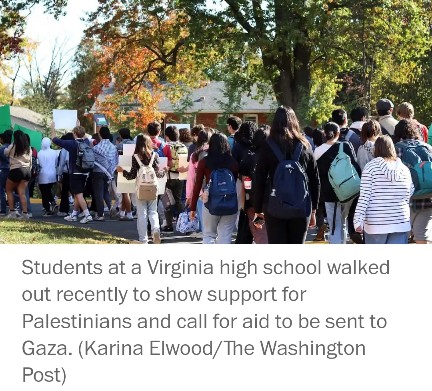The Arizona state superintendent wants to close student clubs after high school members presented what he called “propaganda” about the war in Gaza. A Florida first-grade teacher faces an investigation after she emailed school leaders seeking more recognition for Palestine and Palestinian students in public statements.
And in Virginia’s Loudoun school district, officials recently told a teacher to take down a blended Israeli-American flag after it drew complaints, according to parent Kathy Moritz, whose daughter observed the removals. Moritz said the teacher also chose to remove Jewish holiday decorations, including a menorah. Moritz complained to the principal and said she was allowed to place a menorah in the counseling office, where it joined a Christmas tree already on display. A Loudoun spokeswoman said the district cannot comment on “personnel matters,” but noted that policy forbids employees from making “statements that further a political cause” during school hours.
The ferocious debate over how American students can and should speak about the war in Gaza — a conflict that burst into national view this month after three university presidents testified before Congress about how they respond to antisemitism, spurring outrage — is filtering into the nation’s public schools. Students and teachers at the K-12 level, like their counterparts in college, want to talk or advocate about the war in Gaza. School districts are struggling to figure out how to respond. In some cases, critics charge, they are censoring speech in the name of comity.
“They’re jumpy and afraid,” Moritz said of district officials. “We had a school board meeting where Muslim families said they don’t feel protected; Jewish families don’t feel protected. … The school is in a position where everybody is unhappy.”
The Arizona state superintendent wants to close student clubs after high school members presented what he called “propaganda” about the war in Gaza. A Florida first-grade teacher faces an investigation after she emailed school leaders seeking more recognition for Palestine and Palestinian students in public statements.
And in Virginia’s Loudoun school district, officials recently told a teacher to take down a blended Israeli-American flag after it drew complaints, according to parent Kathy Moritz, whose daughter observed the removals. Moritz said the teacher also chose to remove Jewish holiday decorations, including a menorah. Moritz complained to the principal and said she was allowed to place a menorah in the counseling office, where it joined a Christmas tree already on display. A Loudoun spokeswoman said the district cannot comment on “personnel matters,” but noted that policy forbids employees from making “statements that further a political cause” during school hours.
The ferocious debate over how American students can and should speak about the war in Gaza — a conflict that burst into national view this month after three university presidents testified before Congress about how they respond to antisemitism, spurring outrage — is filtering into the nation’s public schools. Students and teachers at the K-12 level, like their counterparts in college, want to talk or advocate about the war in Gaza. School districts are struggling to figure out how to respond. In some cases, critics charge, they are censoring speech in the name of comity.
“They’re jumpy and afraid,” Moritz said of district officials. “We had a school board meeting where Muslim families said they don’t feel protected; Jewish families don’t feel protected. … The school is in a position where everybody is unhappy.”
The issue is especially difficult to navigate in elementary and secondary classrooms, said Gladys Cruz, president of the School Superintendents Association. It is a raw topic, as the ongoing war costs lives, including some family members of students in the United States. And it is tied to complex history and long-standing divisions between faith groups, which are difficult to grasp but important to teach.
“What we need to be doing is providing a safe environment for civic discourse so students can … learn to disagree respectfully,” Cruz said. “It’s a hard situation, but we need to ensure that, as adults, we model for our children.”
Recent events have made that task harder.
In early December, a Republican House committee summoned the presidents of Harvard, the University of Pennsylvania and the Massachusetts Institute of Technology to testify about how they handled antisemitic harassment since the Oct. 7 Hamas attack on Israel. When the presidents would not say calling for the genocide of Jews violated campus codes of conduct, it sparked condemnation and a bitter national discourse about antisemitism, racism and the limits of free speech. Penn’s president resigned under pressure, and Harvard’s president faces ongoing calls for her ouster.
In K-12 schools, the outlines of the battle are different because speech is more circumscribed, especially for teachers, said Suzanne Eckes, a University of Wisconsin at Madison professor who studies education law. Teachers do not have First Amendment rights in the classroom and must stick to teaching the curriculum their district mandates, she said.
Things are more nuanced for students. A series of Supreme Court rulings have established that children in elementary and secondary school can speak out in school, including on political topics, so long as their words do not cause a “material and substantial campus disruption,” Eckes said.
But schools can take an expansive view of what causes such a disruption. Many blanch at chants of “From the river to the sea, Palestine will be free,” a decades-old rallying cry for Palestinian nationalist aspirations that is also used by Hamas supporters. Some, especially Jews, see it as a call for the annihilation of Israel. But activists defend it as a call for Palestinian self-determination or a secular, binational Jewish-and-Arab state, not a demand for violence against Jews.
In the K-12 context, “Jewish students could say, ‘We don’t feel safe — that clearly creates a material and substantial disruption,’” Eckes said. “On the other hand, pro-Palestinian students might argue we have a right to political speech.”
She added, “That is a really difficult one to judge.”
The Washington Post














